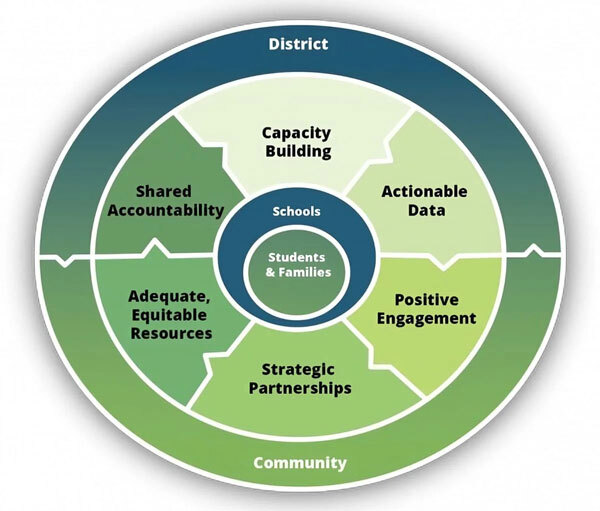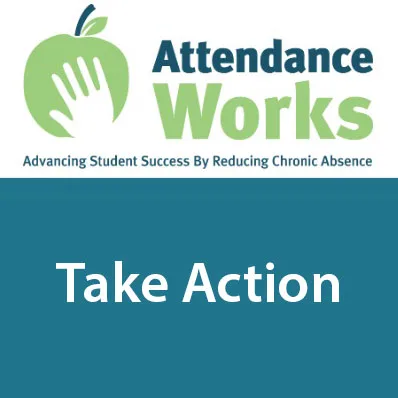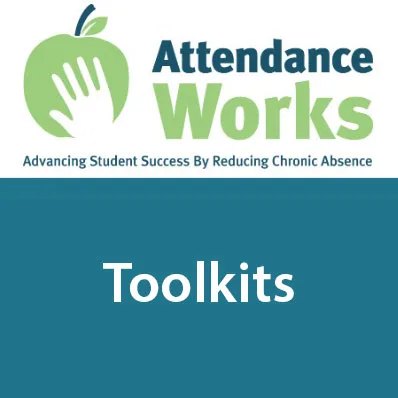Attendance and Absenteeism


Systemically Addressing Attendance
The resources and interventions on this webpage are structured into tiers.
Tier 1 - Encompasses universal strategies applicable to all students and families.
Tier 2 & 3 - Provide increasingly targeted support for students with higher absenteeism levels.
This approach is recognized by educators and public health officials familiar with other multi-tiered support systems like Response to Intervention and Positive Behavioral Interventions and Support.
Tier 1
Tier 1: Universal Prevention
These strategies focus on preventing absenteeism among all students. Examples include setting attendance expectations and recognizing improvements.
Strategy List: Engaging with Families, Student-Teacher Relationships, Relevant-and Culturally Relevant-Instruction, Restorative Discipline Practices, Summer Learning and Afterschool Strategies, Positive Greetings at the Door, Rethinking Recess, Healthy School Buildings, School-based Health Services, Telehealth, Free Meals for All, School Busses, Safer Walk to School, Laundry at School.
Research
Leading Indicators of Long-Term Success in Community Schools: Evidence from New York City
Illustrating the Promise of Community Schools
Using Data and the Human Touch: Evaluating the NYC Inter-Agency Campaign to Reduce Chronic Absenteeism
Resources
Coalition for Community Schools
Federal Resources to Support Community Schools
Addressing education inequality with a next generation of community schools: A blueprint for mayors, states, and the federal government
Tier 2
Tier 2: Targeted Assistance
These interventions aim to remove attendance barriers for students at higher risk of chronic absenteeism, like those nearing or already meeting the 10% absence threshold. They can be applied to individuals or groups with similar challenges, requiring more personalized attention from schools to emphasize the importance of attendance and develop barrier-reduction plans.
Strategy List: Early Warning Systems, Targeted Home Visits, Mentors and Tutors, Targeted Youth Engagement, Addressing Asthma, Mental Health Support and School Refusal, Students with Disabilities, Immigration Enforcement.
Research
Check and Connect
Effect of the School-Based Telemedicine Enhanced Asthma Management Program on Asthma Morbidity
Effect of Full-Time vs. Part-Time School Nurses on Attendance of Elementary Students with Asthma
Getting students on track for graduation: First-year Impact of an Early Warning Intervention and Monitoring System
An Evaluation of the Effectiveness of Home Visits for Re-Engaging Students Who Were Chronically Absent in the Era of Covid-19
Treatment for School Refusal Among Children and Adolescents: A Systematic Review and Meta-Analysis
Students with Disabilities and Chronic Absenteeism
Resources
The Mentoring Effect
Relationships Matter Toolkit
Common Ground: Helping Tutors and Pupils Find Similarities Boosts Session Attendance
Do Written Asthma Action Plans Improve Outcomes?
School Avoidance
Immigrant and Refugee Children: A Guide for Educators and School Support Staff
Tips for an Effective Attendance Team
Example Asthma Plan
Chronic Absenteeism and Students with Disabilities: FAQ
CORE Lessons: Measuring the Social and Emotional Dimensions of Student Success
Tier 3
Tier 3: Intensive Intervention
These interventions offer extensive support to students at the highest risk of chronic absenteeism. They often involve customized case management and may include cooperation with health, housing, and social services agencies. This level of support is beneficial for students missing 20% or more of the school year.
Strategy List: Inter-agency Case Management, Housing Insecurity, Truancy.
Research
Empty Seats: The Epidemic of Absenteeism Among Homeless Elementary Students
Resources
Supporting the Attendance of Students Experiencing Homelessness
FERPA Guidance on Sharing Info with Community-Based Organizations
2022 National Center for Homeless Education: Chronic Absenteeism
Disparities in Juvenile Court Involvement
Treatment for School Refusal Among Children and Adolescents: A systematic Review and Meta-Analysis
Foundational Support
Effective attendance strategies require a foundation of key conditions (Attendance Works website), including physical and emotional well-being, a sense of belonging, engaging academics, active student involvement, and emotional support. These conditions are built through relationship-building and are crucial for motivating students to attend school.










